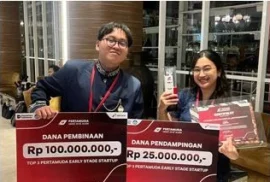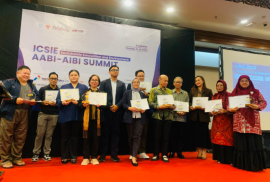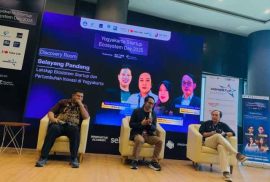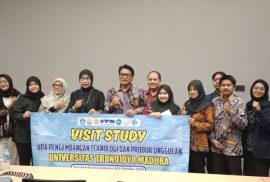
Indonesia, as a megabiodiversity country, plays an important role in global biodiversity issues. This issue is not only about conservation, but also related to food security, health, economy, and even culture. Strengthening biodiversity research must be in line with sustainable development and national resilience. Therefore, research in the field of biodiversity needs to be directed not only at conservation, but also at sustainable use that supports the food, pharmaceutical, renewable energy, and climate change mitigation sectors.
The Chair of the BRIN Steering Committee, Prof. Dr. (H.C.) Hj. Megawati Soekarnoputri, emphasized the importance of nationalism and national sovereignty in every research and innovation effort, including biodiversity management. She asserted that strengthening research must be accompanied by historical awareness, a commitment to protecting the environment, and the courage of the younger generation to take on a role.
Megawati also reminded that Indonesian women have made significant contributions to the nation’s struggle, so their role in research and policy needs to be continuously strengthened. “Young people must remember that this country belongs to you. Use your knowledge and abilities to keep Indonesia independent, sovereign, and eternal,“ she said in a workshop on ”Biodiversity Management and Strengthening Intellectual Property Rights for a Sustainable Future: UGM-BRIN Synergy” at the UGM Senate Hall on Wednesday (1/10).
The Rector of Gadjah Mada University, Prof. Ova Emilia, also emphasized UGM’s commitment to research and conservation of tropical biodiversity through strengthening cooperation between UGM and the National Research and Innovation Agency (BRIN) covering the fields of conservation and intellectual property rights protection. “Through this collaboration, UGM aims to strengthen the biodiversity research ecosystem so that its results can have a real impact on sustainable development,” said UGM Rector Prof. Ova Emilia.
The Rector emphasized that UGM is currently promoting research capacity through excellent facilities such as the Integrated Laboratory Management (MLT), Integrated Genome Factory (IGF), Porok Marine Research Station, Moeso Suryowinoto Indonesia Biodiversity Center (MSIBC) Building, and PIAT Genetic Bank.

Furthermore, UGM has also developed leading programs and innovations, ranging from the first Biodiversity Curator Profession (PKKH) in Southeast Asia, the development of the Indonesian Biodiversity Index (IBI), to consistency in the protection of genetic resources through the PIAT Genetic Bank, which won the Indonesian Breeder Award in 2021. The Rector said that in 2024, UGM recorded 28 copyrights and 30 biodiversity patents, while in 2025, as of September, 11 copyrights and 19 patents had been registered. “This data shows UGM’s commitment to not only continuing to produce innovations but also strengthening legal protection for national biodiversity,” he said.
BRIN Steering Committee member Dr. Bambang Kesowo, S.H., LL.M., emphasized in his keynote speech that the management of national biodiversity cannot be separated from strong IPR governance. He said that without clear legal protection, Indonesia’s research results and biological resources would be vulnerable to exploitation by outside parties. Therefore, comprehensive regulatory design is needed so that biodiversity can be utilized sustainably, while also strengthening the nation’s competitiveness.

Bambang also encouraged UGM to expand education and understanding of intellectual property rights not only in the law faculty, but also in other faculties, namely agro-complex, science, and socio-humanities. “Strengthening intellectual property rights is an important foundation in maintaining the nation’s sovereignty over its rich biodiversity potential,” he said.
The Head of BRIN, Dr. Laksana Tri Handoko, said that research in the field of biodiversity needs to be directed not only at conservation but also at sustainable use that supports the food, pharmaceutical, renewable energy, and climate change mitigation sectors. According to him, collaboration with UGM is strategically important because it can bring about innovations that are relevant to the needs of industry and society, while strengthening Indonesia’s research network at the global level. “We see UGM as a strategic partner in the development of biodiversity research, especially in bringing about innovations that can be commercialized,” said Handoko.
The Dean of the Faculty of Biology at UGM, Prof. Dr. Budi S. Daryono, M.Agr.Sc., presented material on the Status and Trends of the Indonesian Biodiversity Index (IBI), which is currently being developed as a national indicator to monitor the condition of biodiversity. The IBI is used to measure species richness, population distribution, and ecosystem balance, thereby serving as a basis for formulating conservation and sustainable development policies.

According to Budi, this scientific instrument is also important for anticipating the impacts of climate change and supporting the achievement of Indonesia’s SDG targets. “Biodiversity trends in Indonesia need to be monitored scientifically so that conservation measures can be carried out appropriately and sustainably,” said Budi.
This workshop also marked the signing of a Memorandum of Understanding (MoU) between BRIN and UGM on the conservation and utilization of tropical biodiversity, which was signed by the Vice Rector for Research, Business Development, and Cooperation at UGM, Dr. Danang Sri Hadmoko, S.Si., M.Sc. On the same occasion, a Cooperation Agreement (PKS) was also signed between BRIN and UGM regarding the management of intellectual property of biological resources, signed by the Acting Director of Business Development at UGM, Prof. Ir. Sang Kompiang Wirawan, S.T., M.T., Ph.D.
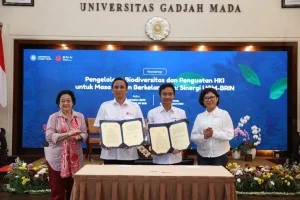
The workshop was also accompanied by a Mini Expo showcasing the results of UGM’s biodiversity downstreaming research. This exhibition showcases various innovations born from Indonesia’s tropical biodiversity and protected through intellectual property rights mechanisms. Through this workshop, UGM further solidifies its position as a center for tropical biodiversity research that not only contributes to the development of science but also provides real solutions for sustainable development.
Author: Triya Andriyani
Photo: Firsto
